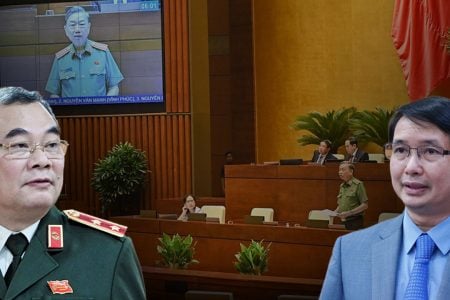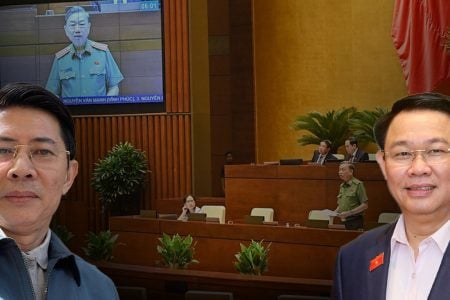
Without or without integrity, especially in the drafting and verifying process of a law project will create many legal documents “shortcomings.”
This is the opinion of Standing Member of the National Defense – Security Committee Nguyen Mai Bo, An Giang province delegate, given in the discussion session on the draft of the National Assembly’s work report in the 14th tenure held on March 26.
Specifically, the three “shortcomings” according to Mr. Nguyen Mai Bo cited by the Vietnamese state-controlled media include: overlapping conflicts in legal documents, legal documents are a tool to realize interests of ministries and branches and conflicts with the interests of the people, and the legal life cycle is very short.
Lawyer Nguyen Van Hau, chairman of the Center for Arbitration of Vietnam Lawyers, concurred with the statement just mentioned by the An Giang province delegate. Lawyer Hau commented:
“The Vietnamese Constitution stipulates that the National Assembly doing legislature, the government doing executive affairs and the judiciary doing legal affairs. These three bodies must be unified, but they can control each other.
Here we want to say that the integrity of law building is when building an objective and comprehensive legal document, which has a meaning of promoting social relations to go up, must be objective, impartial, for the people. Without these, the text overlaps and conflicts with each other.”
From Khanh Hoa, independent journalist Vo Van Tao voiced his views to RFA on the evening of March 29 as follows:
“The leaders of the Communist Party of Vietnam, the most powerful figures of the State of Vietnam, have long held a view that when building laws, it is the law related to any part of the socio-economic life it will require ministries and government agencies in charge of that field to build the laws.
Law-making comes from the interests of people (ministries, branches), not social interests, so it is very contradictory, we can say such laws are not built on the foundation of integrity.”
Journalist Vo Van Tao gave a typical example of the fact that he just mentioned the Law on demonstration, a bill required by both the “four pillars” as well as the people of the country, but assigned to the Ministry of Public Security to make its draft while the ministry does not want people to protest. According to him, this is the reason why Vietnam still has no Law on Demonstration.
Delegate Nguyen Mai Bo said that very few activities in law building (drafting, examining, and discussing) during the tenure of the 14th National Assembly lacked integrity, especially intentional integrity.
Lawyer Nguyen Van Hau has more comments that in addition to integrity concerns, he also has to meet other requirements:
“First of all, I think that the legislative capacity of the National Assembly needs to learn from experience to meet the increasing requirements of the society to regulate the law, especially in building a rule of law state, building a foundation for the market economy to actively integrate with the world.”
According to journalist Vo Van Tao, the reason for the lack of integrity in law-making in Vietnam for a long time has not been resolved because of the country’s governing mechanism. He argued:

“Although Vietnamese state characteristics are said to be of the people, by the people, for the people, the reality is quite the opposite.
Exactly this state, who do the laws protect? This state of the big men, the laws protect the big ones, do not protect the people.”
With many years of experience in the law industry, lawyer Nguyen Van Hau believes that effective national governance can only be built and established when law-making and law enforcement activities are effective.
Therefore, Mr. Hau proposed:
“If there is a law, if there is an error, we have to look back at the process of creating that product, the human capacity to participate in that process, I think there are still many shortcomings and in order to build a solid legal foundation, there must be supervision. It is only possible for the law to come to life and to challenge those regulations.”
Lawyer Nguyen Van Hau said that in other countries when making law, lawyers are hired to draft, support the government, and support the National Assembly so that the lifecycle of those regulations is long.
Therefore, lawyer Hau said that the next term of the National Assembly must have policies dealing with acts of collusion or deliberately going into things of group interest when building laws, there must be a ban.
At the March 26 meeting, delegate Vu Thi Luu Mai of the Hanoi delegation also commented that it is necessary to raise more opinions on people, businesses, and subjects directly affected by the policy.
In particular, online consultation of the people is not really effective, interactive comments on the online draft on the National Assembly’s page and the Vietnamese Government Portal is rare, said legislator Nguyen Thi Viet Nga from Hai Duong province.
Journalist Vo Van Tao said that with the current totalitarian one-party mechanism in Vietnam if you want to change the law, you need to deepen:
“Without changing the political economy, the regime not accepting pluralism, not accepting opposition, no freedom of the press, no freedom to vote, no transparent election … then it is not possible for perfecting the law building process to keeping up with the civilized momentum of the world.”
Thoibao.de (Translated)





























